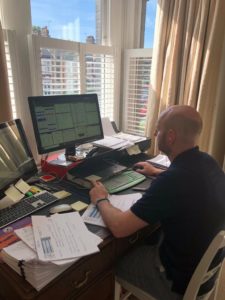How has the Coronavirus affected your day-to-day work – from both a portfolio and workplace perspective?
I have been working from home since 20 March – as indeed have around 98% of my colleagues. In terms of day-to-day work, things have gone remarkably smoothly and I have been able to do everything I would normally have done.
 What has been your biggest contributor to performance since the coronavirus hit markets? What has been your biggest detractor?
What has been your biggest contributor to performance since the coronavirus hit markets? What has been your biggest detractor?
The listed hedge fund BH Macro has undoubtedly been my best holding. It has historically thrived in volatile market conditions and this has proved to be the case again this year. It has seen its NAV rise by more than 24% over the year to-date (to 15 May, according to Reuters) and has shown the importance of its portfolio insurance characteristics. My biggest detractors have been a number of more income and value-oriented funds in the UK, which have really struggled this year.
What has surprised you most about markets during the coronavirus sell-off?
The irrational selling of some alternative asset classes in the investment companies universe. We saw several infrastructure names with little or no exposure to the economic impact of the virus that still saw heavy falls in their share price at the peak of the market turmoil as people sold whatever they could.
What feedback have you had from clients since the sell-off?
Clients have generally been pretty sanguine about things but many have been genuinely surprised to see that their portfolios haven’t fallen by as much as they feared – or indeed as much as the news headlines would have led them to believe. This market has shown the importance of geographic diversification across portfolios.
What are the key messages you want to hear from your holdings at the moment?
What the managers have been up to in their funds and why. We have no problem if drastic changes haven’t taken place either – so long as there is a rational argument for that. There has certainly been no shortage of communication from fund groups, which has kept us firmly in the loop.
How does this compare to other market sell-offs you have managed money through?
I have worked through the bursting of the tech bubble and the global financial crisis. While all different and stressful in different ways, the ability not to panic out at the bottom has been key for all of them. This has been unique in terms of the speed of response from governments and central banks in terms of policies to prop up their economies and the markets.
How do you find working remotely during volatile markets?
Everything works well but I have just found that I have had to work slightly longer hours to get everything done. This is probably because our workloads have exploded in terms of client contact, fund research and so on and maybe, in more normal times, working from home could be incredibly relaxing!
What do you do for fun when you take a break from working at home?
Lunch with the family, often outside in the sun, has been a highlight. I’ve also managed to fit in two Pilates sessions a week – up from the usual one – as well as two or three runs. I’m one of a number of people who has probably got fitter in lockdown.
What is your favourite snack when working from home?
Whatever home-baking my two daughters have produced.
Do you have a ‘top tip’ to share on working remotely?
Make sure you do something that demarks your workday from your home time – ideally something that gets you out into the fresh air. This replaces the downtime you would normally have during your commute and avoids work and home life just merging into one.
James Burns is co-manager of the Smith & Williamson Managed Portfolio Service











